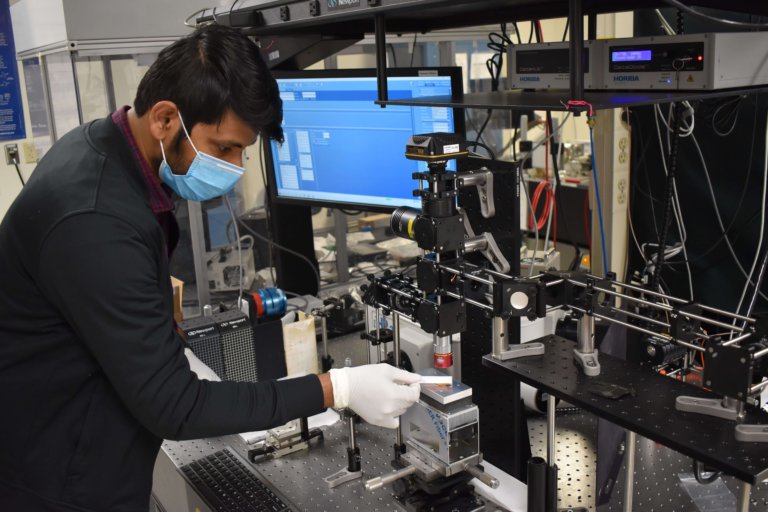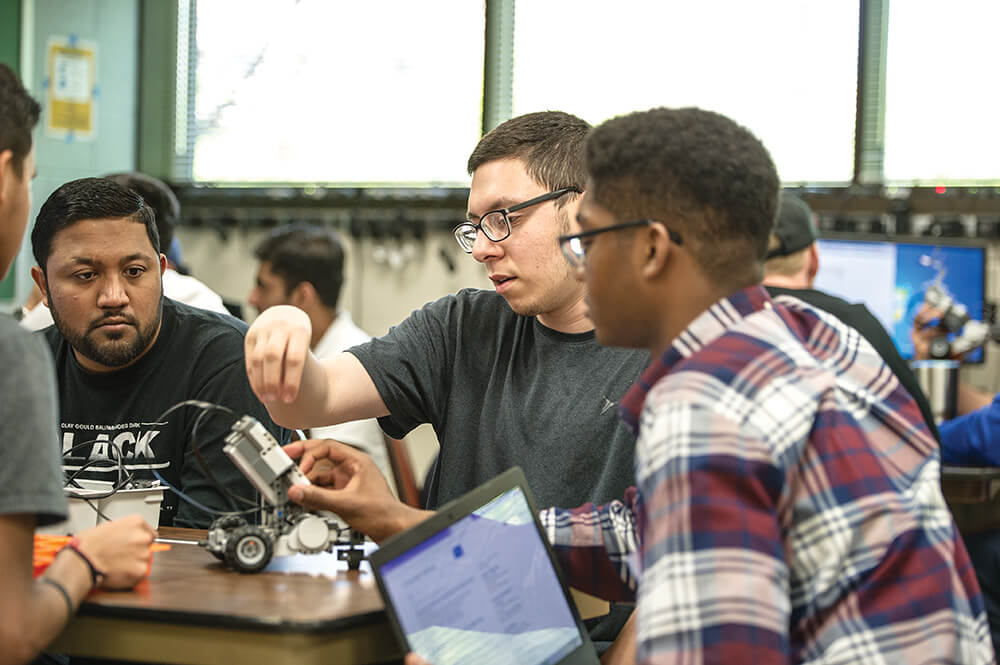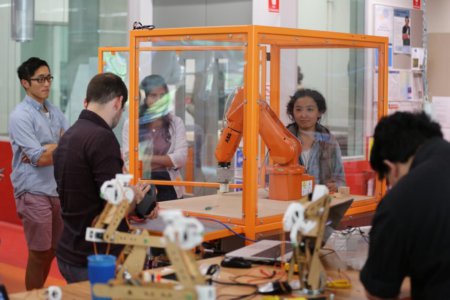
Rising temperatures, rampant pollution, suffocating air quality, population growth, diminishing natural resources, a raging pandemic — the world is entering a pivotal moment in time. Engineers, the experts with the know-how to apply science to the optimum conversion of the resources of nature to the uses of humankind, need to step up.
Changes, small as they may be, can be significant as we create a greener, more sustainable future. The livelihoods of ourselves and our future descendants may very well depend on that one device to reflect the sun’s rays away (and artificially cool the planet), or the electrical vehicle battery that does away with cobalt altogether, or the discovery of new materials to improve the performance of organic solar cells.
These innovations are within reach. At these four universities, researchers and faculty members are working towards building a future where our children can live well:
The University of Texas at Arlington
Largest and most comprehensive engineering school in North Texas and fourth-largest in the state. Focus on entrepreneurship and innovation. Opportunities to compete for seed funding and multiple MakerSpaces to create prototypes. Access to internships, research collaboration and full-time employment. These are the features that define the College of Engineering at The University of Texas at Arlington (UTA).

Source: Uni of Texas at Arlington
UTA offers the most comprehensive engineering programme in North Texas, with 11 baccalaureate, 13 master’s and nine doctoral degree programmes. No matter who you are, where you’re from, or what you want to do, UTA’s College of Engineering has a place for you and your passion. Every UTA degree is engineered for success.
The college has more than 60 years of experience in producing highly trained engineers who go on to fulfilling careers in North Texas and beyond — among our more than 36,000 alumni are two astronauts, many successful entrepreneurs, popular game developers, and dozens of executives at Fortune 500 companies. Current students benefit from their guest classes, recommendations, mentorships and more.
This complements UTA’s accredited programmes — the following programmes are accredited by the Engineering Accreditation Commission of ABET: Biomedical, Aerospace, Architectural, Civil, Computer Engineering, Computer Science, Electrical, Industrial, Mechanical, and Software. Graduates from ABET-accredited programmes are career-ready, have a solid educational foundation and are capable of leading the way in innovation, emerging technologies, and in anticipating the welfare and safety needs of the public.
Students will also have exposure to world-class research. UTA is classified as a Research-1 “highest research activity” institution by the Carnegie Foundation for the Advancement of Teaching. There are four National Academy of Engineering Members, 52 fellows of one or more professional organisations, and 11 fellows of the National Academy of Inventors, all working in 14 primary research focus areas. To learn more about how UTA’s expansive, rigorous and customisable academic experience will help you succeed in your future career, click here.
University of Virginia
UVA Engineering is a highly ranked engineering school within the top-ranked University of Virginia. Here, the approach to research and education puts benefits at the front and centre. Faculty members are dedicated to nurture the engineering leaders of the future and to creating knowledge and technologies for an advanced society.

Source: Shutterstock
“UVA Engineering is at a pivotal moment in its history. Through focus, collaboration and research, we will demonstrate the power of engineers to re-envision the world,” says dean Craig H. Benson.
Founded in 1836, it is the first engineering school in the south and the fourth university-level engineering school in the nation. Today, it is home to over 2,695 undergraduate students in 2016-17. Students are recruited from among the world’s finest — among its first-year class, 96% were in the top 10% of their high school graduating classes. Women make up 32% of its cohort, compared to the national average of 19%. This makes UVA Engineering the top university in the country, among states’ flagship universities, in terms of the proportion of women earning engineering degrees.
At the undergraduate and graduate level, UVA Engineering offers programmes which includes chemical engineering, civil engineering, electrical and systems engineering. “Students today are very interested in experiential education. They want to learn through doing. This is actually one of the most effective ways that we can teach students and get them really engaged passionately in learning,” shares Benson.
Michigan Tech University
The Department of Civil and Environmental Engineering at Michigan Tech offers an educational, professional, and intellectual experience that engineers a better world. Here, students receive unique opportunities leading to keen insight of their discipline, a change-ready foundation and the zeal to improve humanity’s condition.

Source: Shutterstock
Graduate programmes in civil engineering address critical social needs. Programmes such as MS in Civil Engineering; MS in Civil Engineering — Online Programme; and PhD in Civil Engineering blend theory, practice, creativity, and hard work. Students can take part in multidisciplinary research and sustainability initiatives.
The result is excellence — this graduate programme is ranked in the top 50 nationally by US News & World Report, with a track record of significant contributions to society and the profession through teaching, research, and practice.
What sets Michigan Tech’s offerings in this discipline apart is its emphasis on sustainability. Here, students get to work on interdisciplinary research projects and with faculty in the areas of biological sciences, chemistry, forestry, geological engineering and sciences, chemical and mechanical engineering, and environmental policy. The MS in Environmental Engineering and PhD in Environmental Engineering are two programmes that provide a deeper insight into how human systems impact the natural environment and how to engineer systems to protect human health and ecosystems.
The Department also offers an MS in Environmental Engineering Science and an MS in Integrated Geospatial Technology. At the master’s level, you can opt for an online graduate certificate in areas of structures, water resources, sustainable pavement design, and geoinformatics. Learn more about the certificates here.
To learn more about how engineering students at Michigan Tech get a headstart in sustainable development, transportations systems of tomorrow, beneficial infrastructure, and social change while still in school, click here. Don’t forget to submit your free application now to begin your Michigan Tech educational journey!
University of California, Berkeley
The College of Engineering at UC Berkeley is ranked among the top three engineering schools in the world. Dynamic, interdisciplinary and hands-on education — programmes here challenge conventional thinking and emphasise creativity and imagination. Most importantly, it’s a community of researchers, students and faculty members that are driven by social commitment and want to change the world.

Source: Shutterstock
At the Department of Civil and Environmental Engineering, one can find cutting-edge research to find engineering solutions for societal-scale challenges. This allows researchers to introduce new theories and improve understanding in an experiential manner, as well as provide students with the updated tools and techniques needed for solving current problems.
With some of the best laboratories for teaching and research in the US, and a location in the San Francisco Bay Area, to study here is to have numerous exposure to engineering projects as well as professional opportunities.
One in every four undergrads at this department progress to graduate school – making it one of highest percentages in the College of Engineering. Others progress into a myriad of career opportunities, thanks to their skill set gained here to address the many pressing needs to improve and expand the infrastructure and protect the environment.
*Some of the institutions featured in this article are commercial partners of Study International









